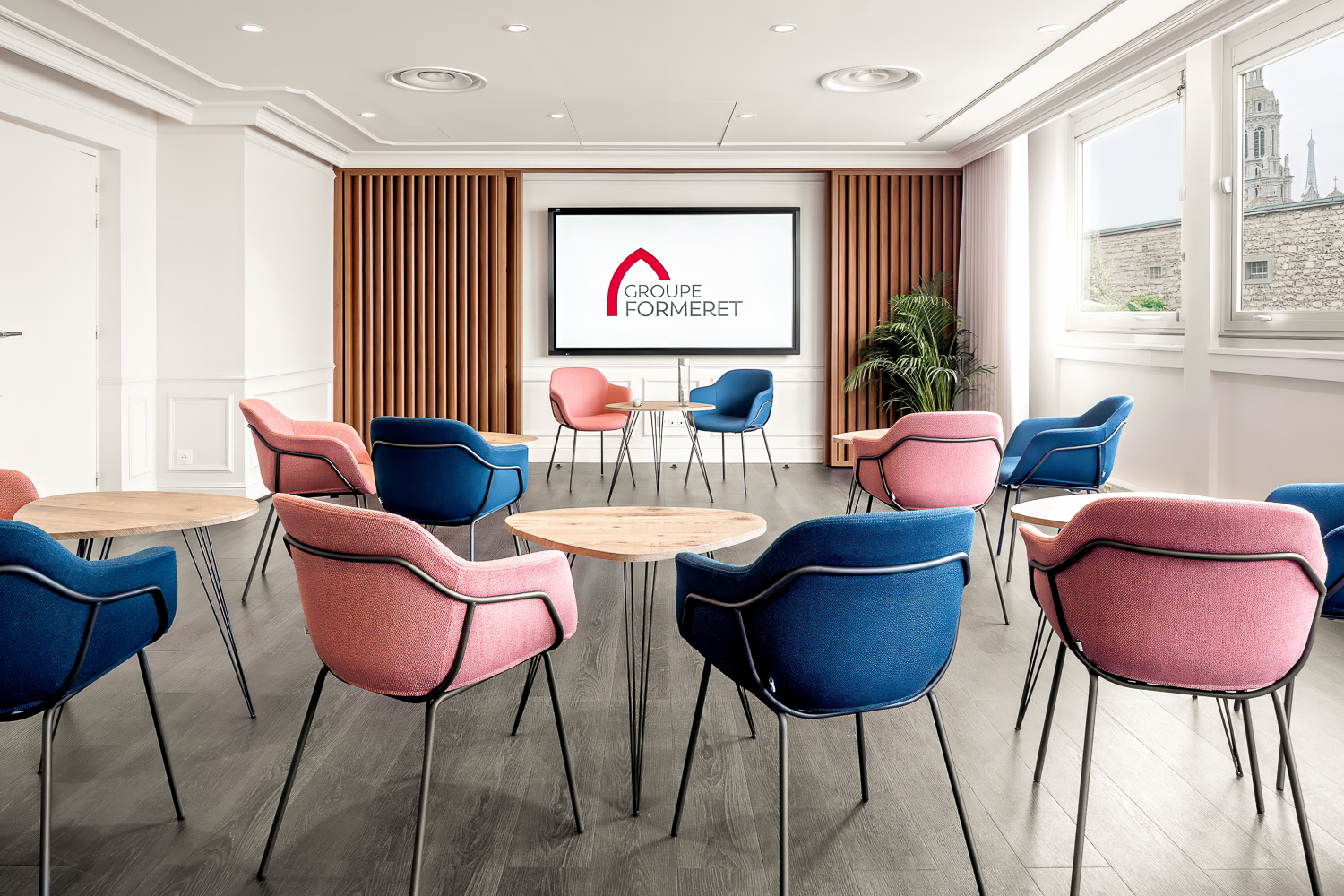What is a management seminar and how do you organize one?

Organize a management seminar allows you to bring together the managers around a common objective: to strengthen cohesion, to stimulate leadership and create a dynamic conducive to collaboration. These moments promote the exchange of experiences, collective reflection and the development of a true team spirit.
At a time when businesses must constantly adapt, federate employees is becoming a strategic issue in maintaining the commitment and performance of team management. Therefore, it is appropriate to ask ourselves how this type of seminar represents a driver of success for organizations and how to make it a lasting tool for cohesion and collective progress?

What is a management seminar?
Before detailing the objectives, it is essential to understand that a management seminar represents a very particular time of exchange in a company. It is a strategic moment that makes it possible to align management teams and to consolidate the links between the various levels of responsibility.
What is the definition of a management seminar?
One management seminar is a time for collective reflection bringing together managers and team leaders around a project or a strategic issue. It is distinguished from the executive seminar, because it is aimed at operational managers and not at managers, with the objective of cohesion and managerial development rather than strategic.
Its aim is to encourage communication and improve managerial practices within the company.
This format is different from Team building or a classic meeting. It is a structured space where we share experiences and where we address the challenges of hierarchical management, of organizational management And of strategic management.
Exchanges can focus on:
- the posture of managers and their role in decision-making;
- coordination between teams;
- changes in corporate culture;
- the improvement of management style, adapted to new challenges.
This approach, often accompanied by a Management training, helps managers adapt their management mode and to promote better synergy between services.
For example: In many companies, this format is used, for example, to bring together managers from the same site to harmonize management practices after an internal reorganization.
{{cta-seminar-room=” /cta "}}
What types of management seminars can be organized according to the objectives?
Business needs vary according to their size, context and ambitions. A seminar can therefore take several forms, each meeting a specific objective:
- The strategic seminar, to take stock, define future directions and mobilize teams around a common vision. For example: when a company wants to prepare its annual action plan, it brings together its managers for a strategic business seminar, focused on the definition of objectives, the synchronization of services and the identification of operational levers.
- The managerial training seminar allows to develop communication, leadership and team management skills. For example: after several internal promotions, an organization can organize a leadership training seminar for new managers, in order to ensure a homogeneous increase in skills.
- The cohesion seminar or the integration seminar, ideal for strengthening relationships after a reorganization or welcoming new employees. For example: a management can organize a managerial cohesion seminar after a merger between two teams in order to improve communication, clarify roles and strengthen cross-department collaboration.
- The transformation or innovation seminar, useful to support a change in management tools, structure or model of strategic management. For example: when deploying a transversal management tool, a digital transformation seminar for managers makes it possible to present the tool, to anticipate its impacts and to identify the new routines to be put in place.
Chez Formeret, these different formats find a favourable environment. Our modular, bright and connected spaces offer you an ideal environment for working collectively during your seminars.

Why organize a management seminar?
Organizing a management seminar meets several essential needs in the life of a company. It is a concrete way to strengthen cohesion Between the team members, to stimulate collective commitment and to support the skills development Within the Top Management as local supervisors.
The benefits for the company
For an organization, the positive effects of a successful management seminar are numerous:
- Improving communication between departments and reduction of internal silos.
- Accelerating decision making, thanks to a more fluid dialogue between the different hierarchical levels.
- Increased engagement and a sense of belonging, which allows promote team cohesion.
- Strengthening agile management, better adapted to the changes associated with digitalization and hybrid work.
- Increase in managerial skills, thanks to exchange times and the discovery of new useful skills to collective performance.
Many organizations use this format after an internal reorganization to conduct a transversal management seminar, which makes it possible to clarify responsibilities and to harmonize operating methods between teams. The result: managers have a common framework, duplications are reduced and priorities are better aligned.
The benefits for the managers themselves
For managers, the seminar can be a Relaxing moment, but also a valuable opportunity to progress and exchange between peers.
In particular, it allows them to:
- take a step back from their practices and experiences in the field,
- sharing solutions during workshops or collective discussions,
- Strengthen the team motivation thanks to a renewed vision of their role.
These moments of reflection encourage autonomy and responsibility, while strengthening human relationships within teams.

How to organize a successful management seminar?
Setting up a management seminar requires method and foresight. Every detail counts, from initial framing to post-event follow-up.
Step 1: Define goals and target audience
First and foremost, it is essential to know why the seminar is being organized and who it is aimed at.
Clarifying the framework makes it possible to design relevant content and involve the right participants.
- Determine the objectives: strengthen cohesion, train teams, rethink the strategy or support a transformation.
- Identify the audience: front-line managers, middle management, Top Management or mixed groups.
- Adapt the duration, the tone and the supports according to the level of the participants.
This preparation phase promotes concentration on priorities and allows everyone to Take a step back on his role.
Step 2: Choose the location, format and logistics
The Choice of location directly influences the quality of the seminar. An environment conducive to exchange and reflection makes all the difference.
For example, Formeret offers you modular, equipped and bright spaces, designed to encourage collaboration.
Some essential points of reference:
- Choose an exotic setting to stimulate creativity, or a “nearsite” format if logistical constraints are strong.
- Determine the format: face-to-face, hybrid or digital depending on the budget and geographic dispersion.
- Plan practical aspects: transport, accommodation (if residential seminar), catering, equipment and general atmosphere.
For example: A multi-site company may prefer a face-to-face management seminar in Paris in order to bring together all managers in a single space, with modular rooms allowing work in sub-groups and plenary sessions.
Step 3: Define content and activities
The content gives meaning to the seminar. It should be balanced between thinking, learning, and relaxing.
The moments of interaction allow teams to consolidate their relationships while strengthening their skills.
Some options to consider:
- Participatory workshops, conferences or feedback focused on concrete cases of project management.
- Team building activities to encourage cooperation: collective challenges, scenarios or Escape game.
- Follow-up sequences: feedback of exchanges, formalization of a action plan, definition of short-term commitments.
Step 4: Communication, Facilitation and Follow-up
The success of a seminar also depends on the clarity of communication and the quality of the animation.
Informing, involving and listening are three essential levers for maintaining collective dynamics.
- Disseminate the objectives, the program and the expectations in advance.
- Entrust the animation to an experienced facilitator or trainer capable of manage effectively And ofSupervising a team while maintaining a friendly atmosphere.
- Evaluate the impact of the event: feedback from participants, satisfaction indicators, monitoring of commitments made.
This post-seminar work makes it possible to anchor learning and to transform exchanges into concrete actions within the company.

Formeret's services
With more than forty years of experience, we support companies in the organization of their seminars and managerial training.
Our three spaces located in Paris (Cléry, La Rochefoucauld and Vinci) offer 170 modular rooms, designed to host any type of professional event. Each place has been designed to combine comfort, performance and conviviality.
Our rooms are fully equipped: high speed fiber optics, screens, video projectors and systems video conferencing. Their flexible configuration allows each space to be adapted according to needs, whether for a manager training, a session of Coaching or a strategic seminar (incentive seminar, back-to-school seminar, commercial seminar, etc.).
In addition to the rental of meeting rooms in Paris, we also offer:
- one Bilingual welcome for your participants;
- one complete logistics including catering and on-site assistance;
- partner hosting solutions;
- dedicated support by our facilitators, guaranteeing the smooth running of your event.
Choosing Formeret means opting for a professional and inspiring framework, entirely focused on the success of your projects. Our expertise allows us to support business managers in their highlights with turnkey services.
Conclusion
One management seminar acts as a lever for cohesion, leadership and performance. By bringing together the directors and managers, the company is consolidating its management practices and reinforces the collective dynamic.
Its success is based on rigorous preparation: defining the objectives, choosing the right format and ensuring concrete follow-up.
Chez Formeret, we know how essential it is tosupport managers in these key moments. This is why we provide you with our experience and our spaces, to make each seminar a unifying and meaningful moment.
FAQ
A management seminar is primarily used to work on management practices, coordination between departments and organizational issues. Team building, on the other hand, is mainly aimed at cohesion and trust between team members through fun activities. The two formats are complementary: the structural seminar, team building reinforces the link. Formeret's modular spaces make it possible to host these two types of events according to the desired objective.
The duration generally varies from half a day to two days. A full day is often preferred, as it offers a good balance between workshops, feedback and collective work. When it comes to reviewing a strategy or supporting a transformation, a two-day seminar can be more effective. Formeret spaces accommodate short formats such as more comprehensive residential seminars.
The budget depends on the location, the number of participants, equipment and associated services (catering, accommodation, entertainment). In the Paris region, you have to count on average 100 to 300€ per participant for a full day. This budget generally covers the room, equipment, breaks and sometimes lunch. The offers offered in Formeret spaces fall within this range while allowing more personalized configurations according to needs.
It depends on the theme and the goals. Local managers are concerned when it comes to harmonizing practices or improving operational communication. Middle management is more mobilized on cross-cutting issues, and managers are more involved in strategic directions. The important thing is to bring together a coherent group capable of acting on the topics covered to ensure the impact of the seminar.
Effectiveness is measured through concrete indicators: level of satisfaction of participants, implementation of decided actions, improvement of internal communication, or reduction of dysfunctions identified before the seminar. A follow-up a few weeks after the event makes it possible to validate the real impact on the teams and to readjust if necessary. This post-seminar feedback is essential to permanently anchor learning.